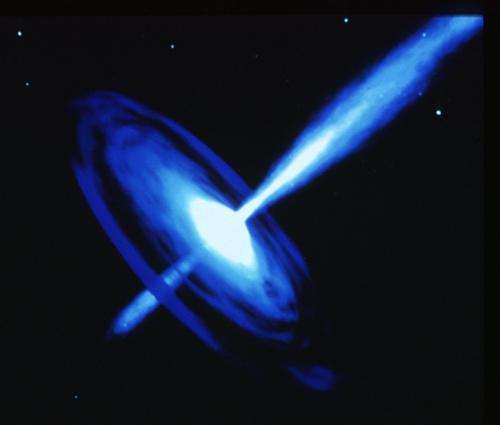Black holes spinning faster than ever before

(PhysOrg.com) -- Two UK astronomers have found that the giant black holes in the centre of galaxies are on average spinning faster than at any time in the history of the Universe. Dr Alejo Martinez-Sansigre of the University of Portsmouth and Prof. Steve Rawlings of the University of Oxford made the new discovery by using radio, optical and X-ray data. They publish their findings in the journal Monthly Notices of the Royal Astronomical Society.
There is strong evidence that every galaxy has a black hole in its centre. These black holes have masses of between a million and a billion Suns and so are referred to as 'supermassive'. They cannot be seen directly, but material swirls around the black hole in a so-called accretion disk before its final demise. That material can become very hot and emit radiation including X-rays that can be detected by space-based telescopes whilst associated radio emission can be detected by telescopes on the ground.
As well as radiation, twin jets are often associated with black holes and their accretion disks. There are many factors that can cause these jets to be produced, but the spin of the supermassive black hole is believed to be important. However, there are conflicting predictions about how the spins of the black holes should be evolving and until now this evolution was not well understood.
Dr Martinez-Sansigre and Professor Rawlings compared theoretical models of spinning black holes with radio, optical and X-ray observations made using a variety of instruments and found that the theories can explain very well the population of supermassive black holes with jets.
Using the radio observations, the two astronomers were able to sample the population of black holes, deducing the spread of the power of the jets. By estimating how they acquire material (the accretion process) the two scientists could then infer how quickly these objects are spinning.
The observations also give information on how the spins of supermassive black holes have evolved. In the past, when the Universe was half its the present size, practically all of the supermassive black holes had very low spins, whereas nowadays a fraction of them have very high spins. So on average, supermassive black holes are spinning faster than ever before.
This is the first time that the evolution of the spin of the supermassive black holes has been constrained and it suggests that those supermassive black holes that grow by swallowing matter will barely spin, while those that merge with other black holes will be left spinning rapidly.
Commenting on the new results, Dr Martinez-Sansigre said: "The spin of black holes can tell you a lot about how they formed. Our results suggest that in recent times a large fraction of the most massive black holes have somehow spun up. A likely explanation is that they have merged with other black holes of similar mass, which is a truly spectacular event, and the end product of this merger is a faster spinning black hole."
Professor Rawlings adds: "Later this decade we hope to test our idea that these supermassive black holes have been set spinning relatively recently. Black hole mergers cause predictable distortions in space and time - so-called gravitational waves. With so many collisions, we expect there to be a cosmic background of gravitational waves, something that will change the timing of the pulses of radio waves that we detect from the remnants of massive stars known as pulsars.
If we are right, this timing change should be picked up by the Square Kilometre Array, the giant radio observatory due to start operating in 2019."
More information: The results are published in the paper, "Observational constraints on the spin of the most massive black holes from radio observations", Martinez-Sansigre A., Rawlings S., Monthly Notices of the Royal Astronomical Society. A preprint of the paper can be seen at arxiv.org/abs/1102.2228
Provided by Royal Astronomical Society



















